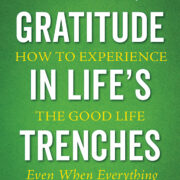From ‘My Pilgrimage Towards Gratefulness‘:
[In his book Man’s Search For Meaning] Viktor Frankl described how conditions of extreme deprivation and cruelty enabled the prisoners to attain incredibly high levels of gratitude for tiny things, such as a colorful sunset or memories of family and loved ones. “We were grateful for the smallest of mercies”, he recalled.
Despite the unimaginably difficult circumstances he had to endure, Frankl found that it was possible to reframe his suffering in positive terms even at the time. Not everyone could do this, for many prisoners lost hope and gave up on life; however for those who clung to their spiritual integrity, it was possible to realize high levels of spiritual freedom and purpose even in the midst of so much deprivation, darkness and death. “[O]ften it is just such an exceptionally difficult external situation which gives man the opportunity to grow spiritually beyond himself”, he wrote in his memoirs.
In one moving passage Frankl told of those who, though starving to death, chose to give their last bits of precious bread to help others, and thus to realize the ultimate sacrifice of choosing to take up one’s cross for the sake of another. Such prisoners were able to add a deeper meaning to what would otherwise be a hopeless and purposeless situation….
Only when we accept that life is difficult, only when we come to terms with the fact that we have no right to be comfortable, happy or prosperous, can we truly be grateful. For once we have accepted that life is difficult and suffering is normal, we can begin to perceive any small amount of joy or comfort as pure gift, like the prisoners in the concentration camp were able to do when they saw a sunset. This suggests not merely that gratitude and suffering can co-exist, but that without suffering it is hard to ever develop a disposition of true gratitude. When life is too easy, we take our blessings for granted; we cease to view the basic necessities of life—warmth, food, shelter and friends—as pure gift.”


